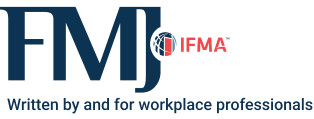Unlocking Operational Excellence
Essential strategies to elevate efficiency

Challenges in FM
The proliferation of hybrid work models has sparked a pressing need for operational leaders to navigate evolving employee expectations. Precision in leveraging workplace technology metrics has become pivotal for these leaders, enabling them to adeptly strategize space utilization and streamline FM. Concurrently, leaders steering asset-centric businesses face a compelling demand to optimize their procedural frameworks, harmonize data streams and unify systems. This concerted effort is geared toward fortifying operational efficiency and bolstering resilience against potential risks, helping FMs safeguard their competitive stance in the market.
Employers in the FM realm identify a noticeable discrepancy between the existing knowledge and skills possessed by their teams and the requisites essential for achieving exemplary performance. This glaring gap underscores a pressing need for upskilling and knowledge enhancement within the FM field.
Eptura’s Q3 Workplace Index Report illuminates a compelling narrative within the operational leadership landscape. Notably, a significant majority, accounting for more than 80 percent of operational leaders have successfully integrated automation into critical systems such as HVAC, security and lighting. This strategic automation serves as a testament to the commitment toward enhancing operational efficiency and streamlining core functionalities.
Discrepancy between the incorporation of automation in core operational facets and the underutilized automation in cleaning processes sheds light on an untapped potential for optimizing daily usage patterns and reducing operational costs. It underscores the unexplored opportunities in leveraging automation for comprehensive facility management, particularly in the sphere of maintenance and cost efficiency.
These reports collectively emphasize the significance of bridging the knowledge gap within FM while spotlighting the uneven integration of automation across various operational domains. Addressing these disparities presents a prime opportunity for FMs and operational leaders to embrace a holistic approach to automation, thereby fostering comprehensive operational efficiency and cost-effectiveness across all facets of the industry.
Technology as a key enabler
It is imperative to adopt diverse tools to gain deeper insights into the current environment. Embracing technology, such as visitor management systems, emerges as an asset for those overseeing building management, offering a comprehensive view of the changing dynamics within the contemporary workspace. Integrating real-time data on space reservations alongside visitor movements provides a nuanced understanding of how the modern office infrastructure is utilized.
FMs must equip themselves with versatile expertise, adapting to work seamlessly across varied domains within a new and uncertain workplace paradigm. This demands a proactive pursuit of knowledge and skill development, tailored to navigate the multifaceted challenges presented. Simultaneously, businesses need to commit to investing in relevant training initiatives, fostering necessary upskilling.
Strategies for enhanced efficiency
 A comprehensive approach to enhancing efficiency in FM involves:
A comprehensive approach to enhancing efficiency in FM involves:
-
Shifting from siloed responsibility to cross-functional collaboration: Encouraging a move away from isolated responsibilities involves fostering a culture of collaboration. By breaking down departmental barriers and encouraging communication between teams, FMs can ensure that various facets of workplace management align seamlessly. Enabling the integration of diverse expertise and perspectives creates a more comprehensive approach to problem solving. By advocating for collaboration between behind-the-scenes asset and facility leaders with front-of-house leaders, FMs can bridge the gap between strategic decision making and operational implementation. Collaboration between different departments cultivates a better understanding of how decisions impact day-to-day operations and vice versa, leading to more informed and effective strategies.
-
Implementing data integration: Integrating data from various sources, such as FM systems, workplace analytics and operational data, empowers FMs to make data-driven decisions. By mapping and analyzing this combined data, FMs can optimize space utilization, improve energy efficiency and anticipate maintenance needs. This integrated approach ensures that decisions align with the workplace's functionality and operational efficiency of the building.
-
Utilizing technology: Leveraging technology, such as visitor management systems and space booking tools, enhances the ability to gather real-time data. This data provides insights into how spaces are used, enabling FMs to optimize layouts and resource allocation. Implementing IoT sensors for environmental monitoring can also contribute to predictive maintenance, ensuring facilities are functioning optimally.
-
Advocating for skill development: Acknowledging the evolving nature of the workplace, FMs should advocate for continuous skill development among their teams. This involves not only technical skills related to FM but also soft skills like adaptability, communication and cross-disciplinary collaboration. A broad skill set equips FMs to navigate the complexities of modern workplaces effectively.
-
Enforcing training and upskilling: Emphasizing the importance of investing in training and upskilling programs for employees is essential. This could involve partnering with educational institutions or implementing in-house training initiatives to ensure that the workforce remains updated with the latest trends, technologies and best practices in FM.
Creating an adaptable framework
By integrating these strategies, FMs can create a dynamic and adaptable framework that not only improves operational efficiency but also fosters a more cohesive and responsive workplace ecosystem.
To adopt flexible working patterns, organizations must move away from siloed responsibility. Behind-the-scenes asset and facility leaders must drive a cross-functional approach with front-of-house leaders in both data analysis and decision making. One place to start is mapping data from FMs with data from workplace leaders. By doing this, businesses will be better able to find the right balance between how the workplace functions and how the buildings need to operate.

Paul Phillips is the chief technical officer at global worktech company Eptura. He is highly experienced in building and managing teams that have engineered systems across multiple sectors for businesses of all sizes. Phillips has extensive knowledge of software as a service focusing on data to drive platform, product and team development, and deliver actionable insights to customers using best-in-class technologies.
Read more on Occupancy & Human Factors , Training and Workplace
Explore All FMJ Topics








